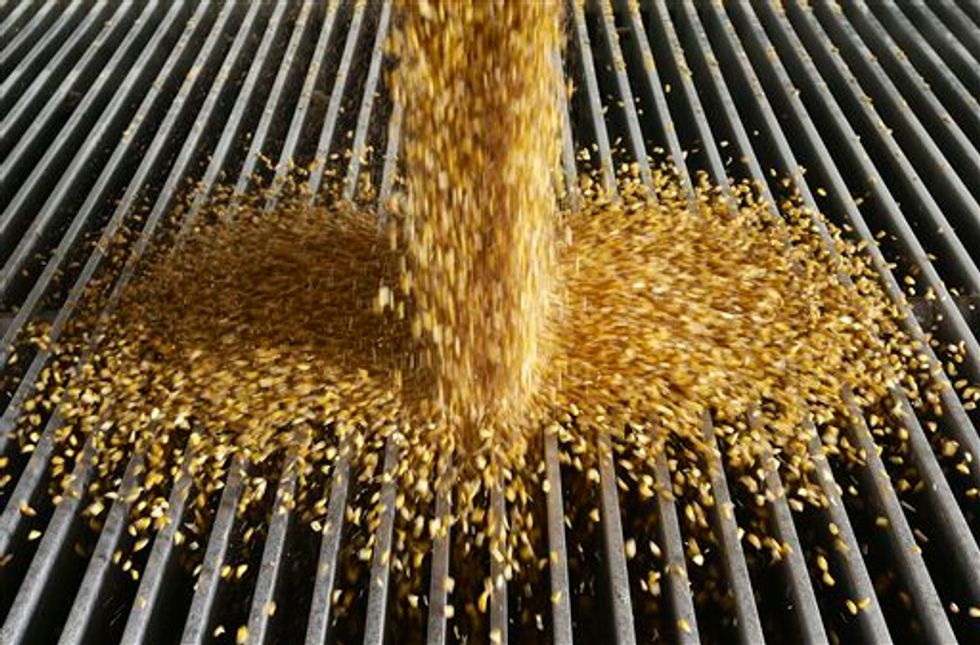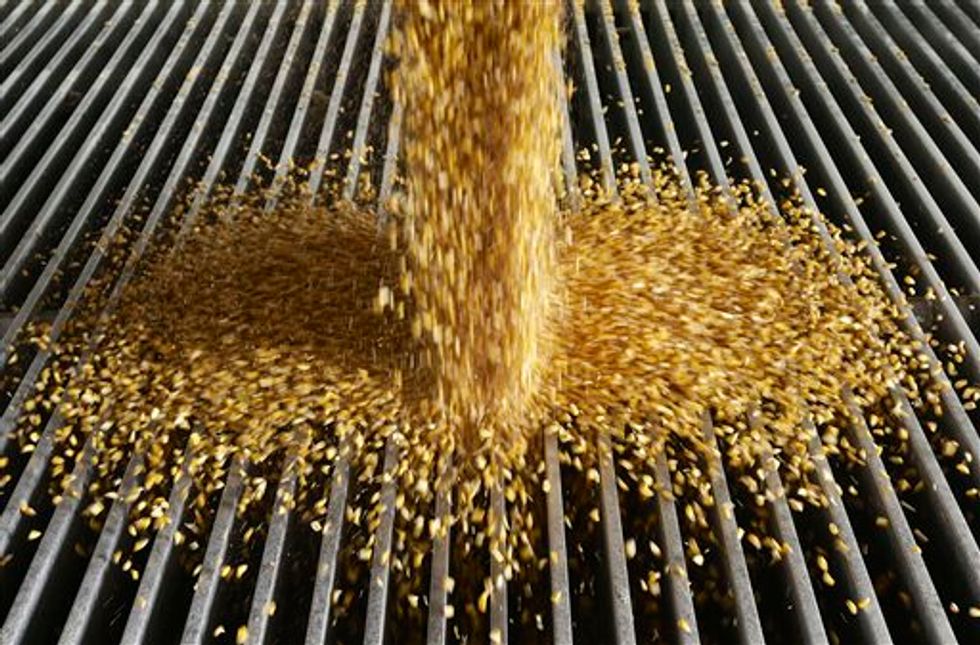On the 10-year anniversary of the federal Renewable Fuel Standard, a team of researchers released a study that concludes the policy created "more problems than solutions."
The report issued last week — "10-Year Review of the Renewable Fuels Standard" — by Drs. Daniel De La Torre Ugarte and Burton English at the University of Tennessee's Institute of Agriculture takes a look at the environmental, economic and industry effects of the RFS.
"Our analysis shows that the RFS has created more problems than solutions, particularly with regard to hampering advancements in biofuels. Corn ethanol was presented as a ‘bridge’ to advanced biofuels and a means of reducing GHG emissions," De La Torre Ugarte said in a statement, referencing a comment made by former EPA Administrator Lisa Jackson. "However, the reality is clear that this policy has been a bridge to nowhere.”
 In this Jan. 6, 2015 file photo, corn is delivered to the Green Plains ethanol plant in Shenandoah, Iowa. Hawaii was poised to end a mandate that fuel for automobiles must be mixed with 10 percent ethanol. (AP/Nati Harnik)
In this Jan. 6, 2015 file photo, corn is delivered to the Green Plains ethanol plant in Shenandoah, Iowa. Hawaii was poised to end a mandate that fuel for automobiles must be mixed with 10 percent ethanol. (AP/Nati Harnik)
The RFS, signed by then President George W. Bush in 2005 was followed by further legislation — the Energy Independence and Security Act — in 2007. The legislation grew the corn-based ethanol industry from 3.9 billion gallons in 2005 to 14.3 billion gallons in 2014, according to the study. Of all the nation's biofuel production, ethanol comprises 87 percent as of 2014.
The report stated that ethanol has "failed to meet expectations across a number of metrics that include air pollutants, water contamination and soil erosion." The study cited conflicting research regarding the lifecycle of ethanol's greenhouse gas emissions compared to that of traditional gasoline and notes that while it has been shown to reduce some pollutants, others have been shown to increase during the biofuel's lifecycle, the study stated.
From an economic standpoint, the study authors noted some localized economic benefits along with some significant losses. Since 2005, the ethanol industry has been supported with $50 billion in subsidies, the report stated.
"Our analysis shows that the corn ethanol industry, even with its tremendous growth over the past decade and technology maturity, cannot survive in any real commercial sense without mandated fuel volume requirements," the authors wrote.
 In this Jan. 6, 2015 file photo, steam blows over fermentation tanks at the Green Plains ethanol plant in Shenandoah, Iowa. (AP/Nati Harnik)
In this Jan. 6, 2015 file photo, steam blows over fermentation tanks at the Green Plains ethanol plant in Shenandoah, Iowa. (AP/Nati Harnik)
Bankruptcies that hit some ethanol refineries during a decrease in oil prices in 2008 and 2009, also reversed some of the economic benefits communities had once seen.
And finally, the study authors concluded that the focus on corn-based ethanol has "stymied the growth of advanced biofuels by receiving substantial RFS targets (10 percent of fuel by volume), essentially retarding the growth of the advanced biofuels sector."
The study authors admitted the hardship of bringing advanced biofuels to the market, but wrote that they would allow the Renewable Fuel Standards' objectives to be better met.
"After 10 years of the RFS and its missed objectives, it is time to re-think the design, structure and practical implementation of the RFS and examine whether other policy designs may be more appropriate for promoting the production and consumption of advanced biofuels," wrote the researchers, whose work was funded by the American Council for Capital Formation, which is a member of the Smarter Fuel Future coalition.
English said in a statement that an over reliance on corn ethanol has "restricted the growth and maturation of the advanced biofuel industry, resulting in fewer environmental and economic benefits."
Renewable Fuels Association, which supports the ethanol industry, said this study by the University of Tennessee was "big-oil funded."
“Over the past decade the Renewable Fuel Standard has proven time and time again why it is our nation’s most successful energy policy,” Geoff Cooper, RFA senior vice president, said in a statement. “Its impact on our nation’s energy security, economy, and environment is unmatched. The RFS was passed by a bi-partisan Congress and signed into law by President George W. Bush with the goal of ensuring that biofuels have a place in a market that is overwhelmingly and unfairly dominated by Big Oil."
The same week this report was released, the EPA’s Office of Inspector General announced that it would conduct research on the lifecycle impact of the RFS.
The inspector general's audit will determine whether the EPA "complied with the reporting requirements of laws authorizing the Renewable Fuel Standard" and if it "updated the lifecycle analysis supporting the RFS with findings from the statutorily mandated National Academy of Sciences" in 2011.
In 2011, the NAS released a study that found not only were the policies "ineffective...for reducing global GHG emissions," but they were unlikely to meet several other targets in advanced biofuel production, among other things.
"Only in an economic environment characterized by high oil prices, technological breakthroughs, and a high implicit or actual carbon price would biofuels be cost competitive with petroleum-based fuels," NAS stated.
On Nov. 30, the EPA is expected to finalize volume requirements for the Renewable Fuel Standards for 2014 and 2015. It proposed lowering these requirements, compared to the current law, earlier this year.

 In this
In this  In this Jan. 6, 2015 file photo, steam blows over fermentation tanks at the Green Plains ethanol plant in Shenandoah, Iowa. (AP/Nati Harnik)
In this Jan. 6, 2015 file photo, steam blows over fermentation tanks at the Green Plains ethanol plant in Shenandoah, Iowa. (AP/Nati Harnik)


